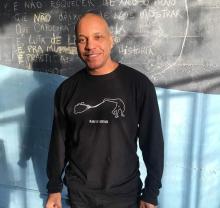Winter Quarter Ethnomusicology Visiting Artist Silvio Dos Reis and students from the School of Music and the UW Dance Department present an end-of-quarter performance including music and movement of Capoeira Angola from Brazil. With members of the International Capoeira Angola studio at Seattle's Union Cultural Center.
Masks are required in all indoor spaces on the UW campus. Patrons must show proof of vaccination or recent negative provider-administered COVID-19 PCR test for entry to live events at Meany Hall. Individuals unable to be fully vaccinated, including children under age five and people with a medical or religious exemption, must have proof of a negative provider-administered COVID-19 PCR test (taken within 72 hours of the performance). UW staff will check for proof of vaccination and negative COVID PCR tests at the doors as a condition of entry. Proof of negative test result must come from a test provider, a laboratory or a health care provider. Home or self-administered tests will not be accepted. Details of these policies and procedures are available here.
PROGRAM DETAIL
Tonight’s event features students in Mestre Silvinho’s “World Music Ensemble” class (Musen 389/589), who will demonstrate some of what they have learned this quarter, along with some of his FICA students and students from his Dance 287 class. The instruments you will hear include the berimbau (musical bow), pandeiro (frame drum), atabaque (standing drum), agogo (double bell) and reco reco (scraper).
Musen 389/589 Students:
Lucinda Extoll, Julia Aguilar Jerez, Joel Bertstrom, Kimani Bishop,
Mayah Bosley, Samuel Bramer, Brandon Cain, Mike Chen,
Maximilian Czerwinski, Elliot Hansen, Juan Hillon, Angie Kong
Karissa Longo, Kieran Matz, Ivan Nolasco Hernandez, Maria Price,
Cooper Schlegel, Emily Silks, Travis Villegas, Max Williams
ARTIST BIO
Silvio Dos Reis
Silvio Dos Reis, known to his students as Mestre Silvinho, is a master of Capoeira Angola, an Afro-Brazilian martial art that integrates music, movement and philosophy. With roots in West Africa, capoeira originated in Brazil around 1600 as a way for Afro-descendents to resist and overthrow the institution of slavery, which they never accepted. Directed by the sounds of the musical bow called berimbau, its music, dance, movements, and rituals became symbols of resilience and community building, connecting Afro-Brazilians to a heritage and dignity from which the slave trade sought to separate them.
Mestre Silvinho, like other mestres of Capoeira Angola, traces his recent lineage to Mestre Pastinha, who brought capoeira into a modern era of national and international visibility when he formed the first school of Capoeira Angola in 1941 in Salvador, Bahia. (Capoeira Angola is considered the original form of capoeira, in distinction to Capoeira Regional which was founded in 1930 by Mestre Bimba as a more institutional and public-facing form.) Silvio began studying capoeira in 1987 with Mestre Jurandir in Belo Horizonte, Minas Gerais state, and eventually attained the status of mestre himself. In 2004 he moved to Seattle, where he established a branch of the Fundação International Capoeira Angola (International Capoeira Angola Federation), or FICA, that his Mestre Jurandir helped to found.
In Seattle Mestre Silvinho and his wife Leika Suzamura manage the Union Cultural Center, a studio space that they make available for classes in a variety of community arts, in addition to Mestre Silvinho’s own capoeira classes and events. He has taught capoeira classes and workshops for a variety of educational organizations, including the Northwest School, Gage Academy summer camps, Seattle Parks and Recreation, Northwest Folklife and several universities, including Evergreen State College, Western Washington University and University of Washington. Through capoeira practice, learning the music and movements, Mestre Silvinho seeks to help people develop self-esteem, form a critical view of the world and connect with one another to build communities and reinvent themselves as human.
